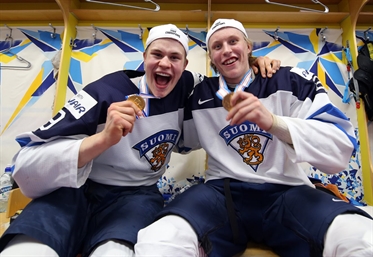Finland on the upswing
Finland on the upswing
A new generation of stars gets Suomi-fans excited

 To of Finland's top prospects celebrate with the gold medal: Jesse Puljujarvi and Patrik Laine. Photo: Andre Ringuette / HHOF-IIHF Images
To of Finland's top prospects celebrate with the gold medal: Jesse Puljujarvi and Patrik Laine. Photo: Andre Ringuette / HHOF-IIHF Images
For a nation that spent decades chasing its first World Championship medal and had only won the World Junior Championship once a decade before (1987, 1998, 2014), that’s almost difficult to understand.
Then again, memories fade and people forget quickly, and also for anybody born, say, 1980 and later, Finland has always been a hockey nation to reckon with. They won their first Olympic medal in 1988, and have won twelve World Championship medals since their first one in 1992.
Most importantly for the latest generation on its way up, the team that just won the World Juniors gold on home ice, Finland has for the last few decades always been a country that can go all the way in a big tournament, not finish fourth or fifth after a brave battle.
Kasperi Kapanen, 19, hadn’t been born in 1995 when his father Sami won the World Championship in Sweden and he was just a toddler when Niklas Hagman did what Kapanen did this week: scored the World Juniors OT game winner against Russia at Hartwall Arena
Patrik Laine and Jesse Puljujarvi hadn’t been born when Jari Kurri’s Finland beat Wayne Gretzky’s Team Canada in Nagano 1998, in a best-on-best tournament in which Finland hadn’t previously fared well.
Sebastian Aho was a few weeks into first grade in school when Miikka Kiprusoff backstopped Finland to World Cup final in 2004 and Olli Juolevi, celebrated his 13th birthday in the middle of the 2011 World Championship. Coached by Jukka Jalonen, Finland went all the way in Bratislava.
And now Juolevi and Jalonen won the World Juniors together. Hockey is a fast-paced sport, but things can change quickly even outside the rink.
Finnish hockey fans can be confident about the future, too. This was Finland’s second World Junior Championship gold in three years. They won the gold in 2014 in Malmo, Sweden, led by Rasmus Ristolainen and Teuvo Teravainen, both NHL regulars now and Teravainen already a Stanley Cup winner with the Chicago Blackhawks.
Ville Pokka is in his second season in the AHL, and is considered one of the best prospects in the Blackhawks’ system. Artturi Lehkonen leads all players that are 20 or under in the Swedish league, and is currently tied for 12th in SHL scoring. Juuse Saros, the World Juniors All-Star goalie from 2014, is also in the AHL.
Let’s not forget that Finland had something of a Dream Team at the World Juniors in 2012 with both Mikael and Markus Granlund, Aleksander Barkov, Teemu Pulkkinen, and Olli Maatta on the team, as well as Ristolainen and Pokka as underaged players then. They led Sweden in the semi-final with 1:44 remaining in the game, and eventually lost it in the shootout.
In a few years, the Finnish men’s national team’s offence will have Barkov, Teravainen, Granlund, Granlund, Pulkkinen, Kapanen, Puljujarvi, Laine, Aho, Lehkonen, Mikko Rantanen, the San Jose Sharks’ Joonas Donskoi, the Winnipeg Jets’ Joel Armia, and veterans like Mikko Koivu, Tuomo Ruutu, Valtteri Filppula, Jori Lehtera, as well as Leo Komarov and Juhamatti Aaltonen. The defence will feature NHL regulars Maatta, Ristolainen, Pokka, and Sami Vatanen, as well as Juolevi, Vili Saarijarvi, Julius Honka, and Esa Lindell, who was recently selected to play in the AHL All-Star Game.
And then of course, there will a couple of late bloomers.
Not a bad foundation to build a team on.
Of course, it’s not like the rest of the world is standing still. Despite Finland’s recent success at the World Juniors, even with a slightly longer perspective, it’s easy to see that the number of true top nations is limited, but that Finland has definitely taken its place in the group.
Since 2010, Team USA has won two World Juniors gold medals, and two bronze medals. Finland has two golds, no other medals. Russia has one gold, three silver medals, and two bronze medals - and has now won medals in six straight tournaments - and Canada and Sweden one gold, two silvers and one bronze each.
Right now, Finland seems to be right at the top of the world, but things do change quickly.
But it’s not like celebrating a hockey gold medal has got old in Finland. The country went completely crazy after the World Juniors again, with grown men throwing themselves into frozen fountains, and thousands of fans greeting the players in the freezing cold.
That’s a good sign, too. Because the day even the fans can’t get excited about a gold is the day the losing begins.
Back to Overview
















































